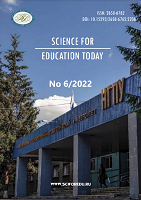Стратегии поведения в конфликте и эмоциональная зрелость студентов педагогического вуза: определение взаимосвязей
Behavior strategies in conflict and emotional maturity of education undergraduates: Identifying relationships
Author(s): Valentina G. Karimova, Ravil' A. Valiev, Lyudmila Aleksandrovna Maksimova , Svetlana A. MinyurovaSubject(s): Educational Psychology, Social psychology and group interaction, Behaviorism, Sociology of Education, Pedagogy
Published by: Новосибирский государственный педагогический университет
Keywords: Strategies of behavior in conflict; Difficult situations of interaction; Emotional intelligence; Emotional maturity; Undergraduates; Future teachers;
Summary/Abstract: Introduction. Consideration of behavioral strategies in difficult situations from the point of view of choosing an effective strategy for conflict resolution is associated with the issue of forming interpersonal interaction competencies. In our opinion, the emotional state of a person and the emotional maturity formed are of great importance in resolving conflict situations within the framework of effective interaction. The purpose of the study is to identify the correlations between the choice of behavior strategies in conflict and the emotional maturity of education undergraduates. Materials and Methods. The study involved 99 first-year undergraduates at the Ural State Pedagogical University. In order to identify respondents' orientation towards certain forms of behavior in a conflict situation, the Thomas-Kilmenn questionnaire was used. In order to identify the level and structural components of the individual's emotional maturity, the authors used O. S. Kocharyan and M.A. Piven’s inventory for emotional maturity assessment. Results. The results of the study confirmed the existence of correlations between the most frequently chosen strategies of behavior in conflict and the components of the emotional maturity of future teachers. The results of the empirical study also include the identification of three behavioral strategies in a conflict situation: individually oriented (high severity of the strategy of competition in conflict and low severity of the strategy of adaptation), passive-adaptive (a high degree of severity of the strategies of avoidance and adaptation and a low severity of the Rivalry strategy), reciprocityoriented (a high severity of the compromise and cooperation strategies and a low severity of the Rivalry strategy). Conclusions. The results obtained can be used to design programs aimed at developing effective ways of interpersonal interaction.
Journal: Science for Education Today
- Issue Year: 12/2022
- Issue No: 6
- Page Range: 55-78
- Page Count: 24
- Language: Russian

